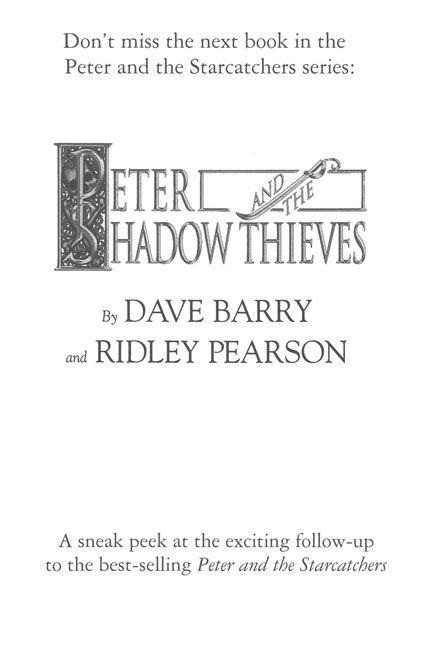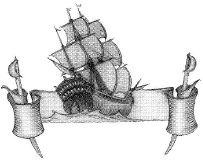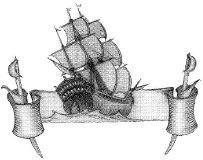Peter and the Starcatchers (45 page)
Read Peter and the Starcatchers Online
Authors: Dave Barry,Ridley Pearson
Tags: #Juvenile Fiction, #Fiction, #General, #Family, #Social Science, #Fantasy, #Action & Adventure, #Magic, #Friendship, #Pirates, #Juvenile Nonfiction, #Orphans, #Nature & the Natural World, #Humorous Stories, #Orphans & Foster Homes, #Adventure and Adventurers, #Islands, #Folklore & Mythology, #Characters in Literature

And then, eyes burning, Mol y ran to the longboat and jumped in, and the Mol usks grabbed the boat’s sides and slid it into the water, and the Starcatchers pul ed on the oars, and the longboat, with Ammm leading the way, glided away from the beach. Mol y sat in the stern, next to her father, looking back at Peter, who stood alone at the water’s edge. His mates, farther up on the beach, were waving; but Peter was only watching, and Mol y knew he was watching only her.
And she was right: Peter watched her until she was only a dot at the mouth of the lagoon, and then she was gone. He turned and trudged up the beach, to where Fighting Prawn stood with James and the others.
“You’l need wood,” said Fighting Prawn.
“What?” said Peter.
“To make your dwel ing,” said Fighting Prawn. “And for your cooking fire. You’l need wood.”
“I suppose that’s so,” said Peter.
“Driftwood is good,” said Fighting Prawn. “Look along the beach. Bring the wood back here, and my people wil show you what to do.”
“Thank you,” said Peter.
The boys split up, looking for wood. Peter walked along the waterline. He thought about flying, but decided he felt more like walking; he was feeling numb, and happy to have a task to keep him occupied. He’d walked several hundred yards when he saw it, sliding back and forth on the sand in the gentle surf: a piece of wood, painted, about six feet long.
He walked to it, picked it up. There were letters on the bottom, letters he’d seen before, on the ship that had carried him from London, the ship that had broken up on the reef that guarded this island. The letters said:
NEVER LAND
Peter looked at it. And then looked around him—at the lagoon; at the rock where the mermaids (Mermaids!) lounged; at the palm-fringed beach; at the tinkling fairy flitting over his head; at his new friends the Mol usks; at the jungle-covered, pirate-infested mountains looming over it al .
Then he looked at the board again, and he laughed out loud.
“That’s exactly where I am,” he said.


THE MARKET
P
ETER, WITH AN EXHAUSTED TlNKER BELL clutching tightly to his shirt, flew low over the dark city until, judging that he was a safe distance from the man, he alit on the peak of a steeply pitched roof. There he crouched, shivering.
“Are you al right?” he said.
Yes,
answered Tink.
But tired.
“That was a good plan you had back there,” he said.
Yes, it was.
They went quiet for a few minutes, recovering. In the east, the black of the night began to soften to a dark gray; dawn was coming as a slight glow through the coal smoke. Peter looked around and saw he was atop a tal ish building, standing alone. To one side was a railroad track; to the other an open square with rows of stal s, apparently some kind of market.
Peter was grateful that the nightmarish night was final y ending, but he dared not let daylight catch him perched in so visible a spot. Sitting down, he slid on his bottom to the edge of the roof, then dropped gently down to the square. No sooner had his bare feet touched the dirt than he began to hear sounds of the awakening day; a cough, voices, barking, cart wheels rumbling on cobblestones.
Peter tucked the protesting Tinker Bel under his shirt and walked down a row of stal s to a low stone wal separating the square from the street. It occurred to him that a market might be a good place to find food. He sat on the wal , his plan for the moment being to wait there until the sel ers arrived, in hopes he might be able to beg or borrow a bite to eat, and then see if anybody could tel him the way to Lord Aster’s house.
Soon enough the sel ers began to arrive, in ones and twos, bringing their wares in by hand and on pushcarts. But it wasn’t food they were sel ing: it was…animals.
Peter and Tink had landed in a pet market, on a street cal ed Brick Lane. The carts were stacked with cages, inside which were al sorts of smal animals—dogs, cats, guinea pigs, turtles, snakes, lizards, chattering monkeys, and birds. Most of al , birds. Hundreds and hundreds of birds, big and smal , native and exotic, bright and drab, sometimes dozens to a cage, twittering, tril ing, tweeting, screeching.
To Peter, it was a meaningless cacophony. But not to Tink. Tink understood the birds perfectly, and what they were saying did not please her at al . Peter felt a vibration, and then Tink’s tiny, furious face poked from his col ar. Quickly he covered her with his hand.
“Get back in there,” he hissed.
They want out,
she said.
“Tink, we can’t…”
They’re hungry and scared. They want to fly.
“ But we…”
Peter’s protest was too late. Tink had pushed through his fingers and was streaking toward a smal , wiry man pushing a cart with four large cages fil ed with canaries, twittering and flitting around like bright yel ow leaves whipped by a late-autumn wind.
“Come back!” cal ed Peter, his voice drawing the attention of the wiry man, who turned away from his cage to look at Peter just as Tink darted past him and landed next to one of his cages. Her motion caught the man’s eye, and he began to turn back toward the cart.
“No!” yel ed Peter, drawing the man’s narrow-set eyes back to him. He was sal ow-faced and thin-lipped, with strands of oil-brown hair plastered to his forehead. Peter saw that, behind the man, Tink had found the cage door and was fiddling with the latch.
“What is it?” said the man, annoyed.
Peter tried frantical y to think of something to say. Tink had the cage door open now and had stuck her head inside.
She was communicating something, somehow, to the birds, who had stopped twittering and were listening to her intently, heads cocked.
“I…ah…” Peter said to the man, “I say, it’s a nice day, isn’t it?”
The man looked at the sky, which was a dul smoky gray, threatening to rain. He gave Peter a venomous look, spat on the ground, and turned back to his cart.
And saw Tink.
The man shot out his hand with the quickness and precision of one skil ed in capturing smal flying creatures. In an instant Tink was caught. Peter saw Tink’s head poking from the top of the man’s right fist as he heard a terrified burst of bel s.
Help! Peter, help!
But Peter was already running toward the man, yel ing, “Put her down! She’s mine!” he shouted. “Put her…UH.” As quickly as the man’s right hand had grabbed Tink, his left fist shot out, catching Peter on his cheek. Peter’s head snapped sideways, and he saw a flash of light. Then, without being aware of fal ing, he was lying on his back in the dirt, the right side of his face throbbing in pain.
Above him he saw the man holding Tink’s struggling form close to his face, examining her. Then, after glancing down at Peter, he thrust her into the canary cage and closed the door.
Peter, woozy, his face screaming in pain, struggled unsteadily to his feet.
“Let her go!” he shouted at the man. “You can’t keep her! She’s not yours!”
“Now she is,” the man said softly. “She’s al mine.” He stared at her, intrigued. “But
what
is she? Ain’t never seen one like her.” Peter lunged toward the cage again, but the man was too quick, and far too strong. He stepped in front of Peter and, grabbing him by his shoulders, hurled him to the ground again. The man then covered the canary cage with a piece of canvas, tying it tightly in place with a piece of rope. From within Peter could hear the muffled sound of Tink’s frantic appeals for help.
Yet again he stood up, standing a few feet away out of the man’s reach.
“Please,” he begged the man. “Please. Let her go.”
“If you know what’s good for you,” said the man, taking a menacing step toward Peter, “you’l get out of here.”
“No!” shouted Peter, though he took a step back. “Let her go!”
By now a half dozen other pet sel ers had wandered over to find out what the noise was about. Peter turned to them.
“He’s got my…my bird,” he said, pointing to the wiry man. “He stole my bird!”
The man shook his head as he turned to the other sel ers.
He addressed them calmly, the voice of reason. “Do you believe the cheek of this one?” he said. “He tries to steal one of me canaries, and then he cal s me the thief! Me, who’s worked this market for ten years and more!”
The other sel ers, al of whom knew the man, shook their heads at the sorry state of modern youth.
“It’s not true!” said Peter desperately. “He’s lying!” Seeing that nobody in the crowd believed him, he ignored his throbbing cheek and hurled himself again toward the cage. The wiry man was waiting for him. He grinned with satisfaction as he drove his fist deep into Peter’s stomach.
Peter went down on al fours, unable to breathe, the pain in his bel y almost unendurable. The pet sel ers roared with laughter. After a few moments Peter was able to draw in some air in smal , tortured gasps. He raised his head, saw the wiry man laughing with the others, saw the canvas-covered cage, heard Tink’s faint, frantic cal s from within.
With agonizing effort, Peter staggered to his feet and again lunged forward, this time managing to reach the cage. He grabbed the handle just as the wiry man grabbed him, pul ing back his fist to deliver another blow to Peter’s face.
“Here now!” boomed a new, deeply authoritative voice. “What’s this al about?”
The wiry man dropped his fist. He and Peter turned to find themselves facing a police officer, a large man sporting a luxuriant walrus moustache.
“He’s a thief,” said the wiry man, pointing to Peter holding the cage. “Tried to steal me best canaries, he did.” The wiry man appealed to the other pet sel ers, who nodded in sober confirmation.
“A thief, is it?” said the bobby, grabbing Peter by his shirt col ar. “Hand it over, then,” he said, taking Peter roughly by the arm.
“But she’s
mine!
” said Peter. “I…
OW!
”
He was silenced by a sharp poke in the ribs from the bobby’s stick.
“You save your talk for the magistrate,” said the bobby sternly. “Not that he’l want to hear it either.” This witticism drew a hearty laugh from the pet sel ers.
“Come along, then,” said the bobby. He yanked the birdcage away from Peter and handed it back to the sel er.
Peter?
In the noise of the market, only Peter heard the muffled bel s. He stepped toward the cage again, only to be jerked violently away by the bobby, who began dragging him down the street, away from the market. Peter tried to jump—hoping, in desperation, to fly his way free of this predicament—but the bobby’s massive hand held his arm in an iron grip.
As they reached the end of Brick Lane, Peter took a last glance back at the pet sel er, who was watching him, smiling, as he tied a second rope around his now-precious canary cage. The last thing Peter heard, as he lost sight of the market, was the distant, muffled, desperate sound of bel s….

THE STANDOFF
T
HE JAIL CELL REEKED of vomit and menace. Peter sat in a corner, where he’d remained since the bobby had shoved him in there, trying his best not to be noticed by the others.
There were eleven of them: three boys younger—or at least smal er—than Peter, five boys older, and three men. Peter wasn’t so worried about the men: al three were drunk and seemed mostly interested in sleeping, although one had awakened long enough to empty the contents of his stomach onto himself and onto the floor, fil ing the cel with an acrid stench before fal ing back into a deep, snoring slumber.
